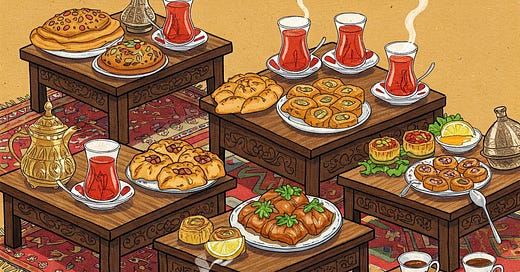The Secret Gravity of Turkish Hospitality
A journey through Turkish gatherings, time without clocks, and the magnetic pull of tea, cake, sarma and endless conversations in the orbit of crumbling pastries and endless conversations.
Nested triplet coffee tables...
Small, medium, and large...
A tiny table for every guest group.
Tea, pastries and shared bites... Probably stuffed grape leaves, sarma and stuffed pepper, dolma.
Maybe Turkish coffee and some baklava...
Like a matryoshka doll, those tiny, portable, endlessly multiplying, classic sehpas1…
Their end never comes! Because, well, guests in Turkey don’t exactly arrive by the clock! They appear from an unpredictable future.
Turks, who themselves have no clue what might happen on the road, can never assign a proper time slot to their gatherings or parties. They’ll just say, “around noon,” or “late afternoon.” Or simply, “We’re coming tomorrow!”
My Danish husband calls these occasions “parties with no official beginning or end” — a very accurate description of Turkish celebrations.
It’s a universe where lemon cake, made with a secret family recipe, floats in the air alongside crimson-hued tea in delicate, hourglass-shaped glasses;
where coffee tables (sehpa) level up like characters in a video game;
where guests arrive two by two, every hour or so; where pastries morph in shape and filling. Where an aunt who’s spent half a light-year stuck in Istanbul traffic silently prays for a wormhole to open up and suck her straight to her destination.
And in these endlessly bending hours, the one thing that anchors everyone to life are those magnetic coffee tables that flock to you the second you step into the house, always overflowing, always ready.
Because of this wonderful chaos, there are no long set tables, no strict mealtime gatherings.
Instead, a feast of timeless foods is born; bulgur salads (kısır), pastries, cakes, sweet and savory cookies and bizarre, mayonnaise-loaded pasta salads, whose origins remain a mystery (some blame Russia, others America). They somehow converge on a single plate, crossing all boundaries, where sweet touches savory and flavors melt together.
Conversations turn into a galaxy of gossip particles scattering faster than the speed of light.
Meanwhile, in Denmark, you simply go by the map pin:
“We’ll be there at 12:37!” or, “Dinner starts at 17:00. Gifts at 17:30. Toasts at 17:45. Give or take.” Here, time resolution is so unbelievably high, I’m pretty sure in a few years, Danes will ditch wristwatches altogether and switch to atomic clocks to measure nano-second differences.
Predictability is so strong, even the meals reflect it:
No matter which universe you stumble into, herring will never touch white bread. Buses will arrive on time. Events are planned one, maybe even two years in advance. "Are you free on June 18th?" they’ll ask.
"Next year?"
The only unpredictable thing here might just be... The weather or just simply when you’ll bite into a juicy, sweet piece of fruit.
However, no matter what, there’s always something in common: being gathered around a table. Big or small. Bread on bottom or börek on side. Small glass of snaps or thin glass of tea. Planned or without the need for a plan, but a table which is filled with people.
Sincerely...
May your homes always be full of different shapes of sehpas.
Nesrin Eren
Sehpa* small, low tables used in Turkish homes to serve tea, snacks, and basically everything life throws at you.






Love this and the role of the sehpa in Turkish hospitality! Great piece ♥️